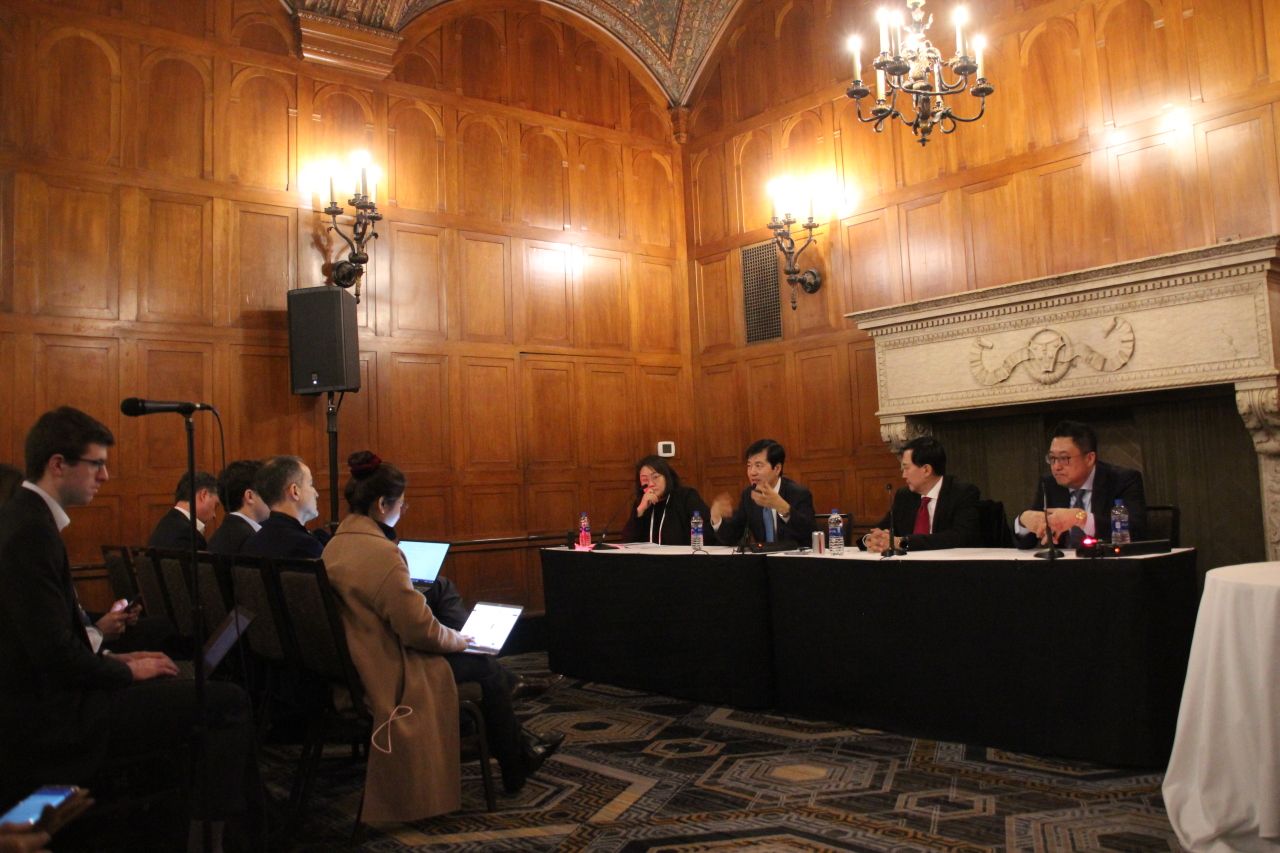SAN FRANCISCO -- Kim Tae-han, the CEO of Samsung Biologics, said Wednesday that he expects to take on contract manufacturing deals for Alzheimer’s disease treatments, and that the company will be ready when the opportunity arises.
Kim, speaking to investors at JP Morgan Healthcare Conference 2020 in San Francisco, said Biogen’s Alzheimer’s pipeline aducanumab has proven its efficacy through data. The only hurdle to US Food and Drug Administration approval, Kim said, was the compliance issue -- one of Biogen’s two phase 3 clinical trials had fewer people than initially pitched.
 |
Samsung Biologics CEO Kim Tae-han (second from left) speaks to reporters at JP Morgan Healthcare Conference 2020. (Lim Jeong-yeo/The Korea Herald) |
“So the pending question is if FDA will still recognize aducanumab’s efficacy. But even if aducanumab fails to gain FDA approval, there’s still going to be another molecule from another company. Eli Lilly and Roche are both also tackling the Alzheimer’s. And after that, there will come the Parkinson’s and Huntington’s treatments, won’t they?” Kim said.
There are 50 million Alzheimer’s patients worldwide. If 10 percent of these patients sought the new treatment, considering that the annual dose per patient is 8 grams, the company estimates that 42 tons of the drug would have to be produced every year to meet demand.
Samsung Biologics, the biggest contract manufacturing organization in terms of throughput capacity, can produce 20 tons at its third plant.
Currently, the first and the second plants are operating nearly at full capacity, while the third plant is 35 percent utilized.
“Our goal last year was to achieve 50 percent utilization rate for plant 3 but the accounting issue hampered that. For 2020, we aspire to utilize 60 percent of our plant 3,” John Rim, Samsung Biologics’ vice president, said, taking the baton from CEO Kim in the presentation.
If Biogen’s Alzheimer’s CMO deal falls on Samsung Biologics, it would not only hit 100 percent utilization of its third plant, but would also require a fourth. And that’s where Samsung Biologics is ahead of its competitors.
Samsung Biologics already has a big slab of land secured next to its three plants in Songdo, Incheon. It can build a biologics plant that adheres to good manufacturing practices 40 percent faster than most other companies in the same field.
Samsung Biologics’ first plant was ready in 25 months, the second plant in 29 months and the third and most innovative one in 35 months, according to the company. Most firms take four to five years.
The company can build its plants at this rapid rate thanks to Samsung Group’s experience of having built some 1,700 plants, including over 20 semiconductor plants.
A semiconductor plant and a biologics plant share much in common, as both must be completely aseptic and transparently operated. A petrochemical plant has piping techniques akin to those of a biopharma facility.
At its first plant, Samsung Biologics has six 5,000-liter bioreactors capable of holding 30,000 liters total. At the second plant, it has 10 15,000-liter and four 1,000-liter bioreactors for a total capacity of 154,000 liters. At the third plant, there are 12 15,000-liter bioreactors with a total capacity of 180,000 liters.
The first plant is the industry standard, while the third houses much bigger bioreactors, equipped with N-1 perfusion technology so that cell lines grow 10 times faster than they otherwise would.
If Biogen’s aducanumab receives the green light from the FDA, Samsung Biologics is indeed a likely CMO partner. The ideal plan in that scenario would be to create a fourth plant that is a replica of the third.
Biogen and Samsung Biologics share facilities through a unique relationship, having opened a biotech joint venture called Samsung Bioepis. Not only do the two work together, but Samsung Biologics’ cutting-edge facility is available for immediate use.
If aducanumab fails, there is a chance that Samsung Biologics will equip its fourth plant with small-scale bioreactors to diversify its portfolio for its new business unit, a small-scale CMO for biotechs.
Even without an Alzheimer’s disease treatment CMO, the third plant will achieve near full utilization by 2022, Rim said.
By Lim Jeong-yeo (
kaylalim@heraldcorp.com)
Korea Herald correspondent






![[Herald Interview] 'Trump will use tariffs as first line of defense for American manufacturing'](http://res.heraldm.com/phpwas/restmb_idxmake.php?idx=644&simg=/content/image/2024/11/26/20241126050017_0.jpg)
![[Health and care] Getting cancer young: Why cancer isn’t just an older person’s battle](http://res.heraldm.com/phpwas/restmb_idxmake.php?idx=644&simg=/content/image/2024/11/26/20241126050043_0.jpg)
